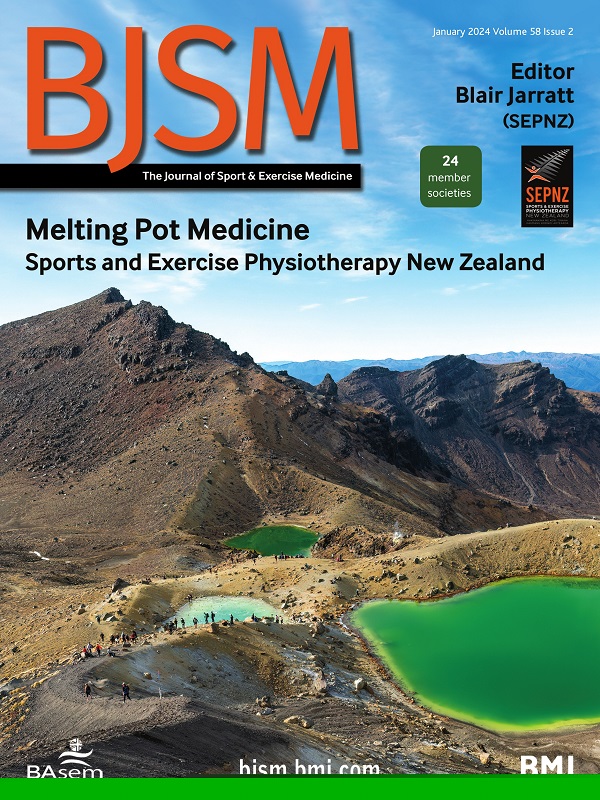2025 Canadian guideline for physical activity, sedentary behaviour and sleep throughout the first year post partum
IF 11.6
1区 医学
Q1 SPORT SCIENCES
引用次数: 0
Abstract
This consensus aims to provide guidance for postpartum women and people, healthcare providers and exercise professionals on physical activity, sedentary behaviour and sleep throughout the first year postpartum. The development of this guideline followed the Grading of Recommendations Assessment, Development and Evaluation (GRADE) methodology and the Appraisal of Guidelines for Research and Evaluation II instrument. The Guideline Consensus Panel consisted of representatives from key professional groups, researchers and methodological experts. Literature was retrieved through searches of 12 online databases, and articles on maternal physical activity, sedentary behaviour or sleep in the first year after childbirth were eligible for inclusion if they reported on any of 21 maternal or infant health outcomes, which were prioritised considering the preferences and values of postpartum individuals. There was no restriction on language, and all study designs were eligible except for case studies. The certainty of evidence was rated using GRADE. This evidence review produced seven systematic reviews, which informed this consensus statement. A Delphi process was conducted to identify relative contraindications to postpartum moderate-intensity to vigorous-intensity physical activity, which informed the development of the Get Active Questionnaire for Postpartum. Evidence to decision tables were developed, and feedback on the recommendations was solicited from end users (healthcare providers, exercise professionals, researchers, policy organisations and postpartum women and people). Adhering to these consensus recommendations for postpartum women and people is likely to result in large improvements in psychological well-being, as well as pelvic, musculoskeletal and cardiometabolic health, and reduced fatigue, while not experiencing adverse events (moderate certainty evidence). Most end users indicated that following these recommendations would be feasible, acceptable and equitable, and likely to require minimal resources from individual and health systems perspectives. PROSPERO registration number CRD42022359282.2025加拿大产后第一年的身体活动、久坐行为和睡眠指南
这一共识旨在为产后妇女和人们、医疗保健提供者和运动专业人员在产后第一年的身体活动、久坐行为和睡眠方面提供指导。本指南的制定遵循了建议分级、评估、发展和评估(GRADE)方法和研究和评估指南II评估工具。指南共识小组由主要专业团体的代表、研究人员和方法专家组成。通过对12个在线数据库的搜索检索文献,如果有关产妇在分娩后第一年的身体活动、久坐行为或睡眠的文章报告了21种产妇或婴儿健康结果中的任何一种,就有资格纳入研究,考虑到产后个体的偏好和价值观,这些结果是优先考虑的。没有语言限制,除个案研究外,所有研究设计均符合条件。证据的确定性用GRADE评定。这项证据审查产生了七项系统审查,为本共识声明提供了依据。采用德尔菲法确定产后中等强度至高强度体力活动的相对禁忌症,为产后积极活动问卷的编制提供信息。制定了决策表的证据,并征求了最终用户(医疗保健提供者、运动专业人员、研究人员、政策组织和产后妇女和人)对建议的反馈。坚持这些对产后妇女和人们的一致建议,可能会大大改善心理健康,以及盆腔、肌肉骨骼和心脏代谢健康,减少疲劳,同时不会出现不良事件(中等确定性证据)。大多数最终用户表示,遵循这些建议是可行的、可接受的和公平的,从个人和卫生系统的角度来看,可能需要最少的资源。普洛斯彼罗注册号CRD42022359282。
本文章由计算机程序翻译,如有差异,请以英文原文为准。
求助全文
约1分钟内获得全文
求助全文
来源期刊
CiteScore
27.10
自引率
4.90%
发文量
217
审稿时长
3-8 weeks
期刊介绍:
The British Journal of Sports Medicine (BJSM) is a dynamic platform that presents groundbreaking research, thought-provoking reviews, and meaningful discussions on sport and exercise medicine. Our focus encompasses various clinically-relevant aspects such as physiotherapy, physical therapy, and rehabilitation. With an aim to foster innovation, education, and knowledge translation, we strive to bridge the gap between research and practical implementation in the field. Our multi-media approach, including web, print, video, and audio resources, along with our active presence on social media, connects a global community of healthcare professionals dedicated to treating active individuals.

 求助内容:
求助内容: 应助结果提醒方式:
应助结果提醒方式:


